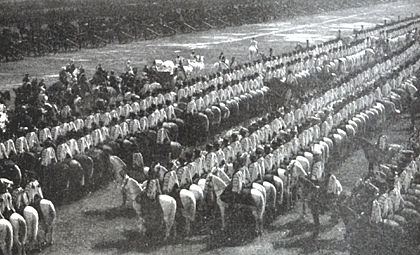   

This picture shows the annual 1900 spring review in the Field of Mars, a vast open space near center of town close to the barracks of the Imperial Guard. The review was a dazzling spectacle which demonstrated the power and might of the Russian Empire. Almost 128,000 men took part - Cossack, Hussars, Lancers, Dragoons and the like - a sea of superb uniforms and fine horses. It seemed to visitors that the whole of the city was there to watch. Tickets were issued for grandstand seats near the Imperial pavilion and loge, where the Empress, Mother, Empress and other Romanov women watched the review. There seats were for Ambassadors, special guests and the city's elite.
Burton Holmes and his American team visited the Field of Mars for the great review and he writes:
"In endless double lines they pass the Tsar, then wheeling left, sweep past the place that we have chosen for this part of the review. Well chosen it was, but not without its perils, as one of the motion pictures proves, for one careless squadron literally rides over us, The full tide of over twenty-thousand men having matched, dashed, or thundered by, - on foot, in the saddle, or on the caissons of the guns, - the field is cleared of all save the magnificent array of cavalry. The gorgeous squadrons are then massed on the farther side of the field, facing the Emperor. A silence reigns, the crowd upon the housetops, in the windows, in the grand-stand, and in the streets below are hushed. They know that something tremendous is now about to happen, - something that may cost several lives, for these thousands of horseman cannot sweep across this field at a breakneck gallop and then at a sudden command halt instantaneously, without some accident. The charge itself defies description. No picture can reveal the splendor of the coloring, or suggest the majestic disciplined turbulence of the flood of mounted men that now sweeps toward the Tsar, like a tinted tidal wave. Then the wave breaks, and its dusty spray is dissipated. The generals and marshals now form a semicircle before their Imperial Master. One by one they approach the Tsar. Some present papers or reports, all receive words of compliment for the successful issue of the day."

Above: The Hussars ready for the charge. In 1900 there was no doubt that Russia was a great power. For generations Russia had played an important role in the affairs of Europe and Asia through its army and the ability of the government to raise hundreds of thousands of infantry from the peasants to fight the country's wars. This power was not always used in Russia's interest - it was also used to prop up unsteady monarchies and crush rebellions in other countries where Russian national interests weren't threatened. Russia's army was used as a mobile European police force to enforce the status quo.
Russia spent tremendous sums on its army - far beyond what the country could afford in order to pursue a role in big power politics. This investment came at the cost of the development of the country's infrastructure and social services. The Imperial Government was unwilling to sacrifice Russia's power-position or to put the reputation of its army at risk so it continued in increase military expenditures in competition with it's European neighbors, such as England and Germany. This was a completion that Russia could not win.
In 1900 Russia was still a poor, underdeveloped country - a nation with great hopes and prospects - but still a backward country that lacked roads, railroads, electrical and communications systems. She had not yet experienced the full industrial development that her rivals Germany, France and England had already seen the benefit of. These countries, even though they were much smaller than Russia in terms of land-size and population, had economies that were huge in relationship to Russia's. Russia was growing fast but it would have taken her at least 25 years to catch up to western Europe.
"Pride cometh before the fall" and it was national pride - the relentless pursuit of international power - that was to be Russia's nadir. Monies that might have gone for the stimulation of industrial development and raising of the educational level of the people and their health instead went to pay for the pro visioning of armies, the purchase of battleships and reckless Far Eastern land-grabs. Russia's leaders of the time all at fault, but in this case the European monarchical system was especially so. Russia's Tsars often let personal rivalries with other monarchs and the pursuit of Russian 'glory' - practically institutionalized in the throne and the military - take precedence over the needs of the people of the country. The Tsars always saw the army as the backbone of the country and the chief support for their throne, they expected the people to support the army regardless of the cost.
The demands of World War I accentuated all of the contradictions, weaknesses and divisions within Russia. The war forced the entire country to go into overdrive, something the weak economy and underdeveloped national infrastructure could not handle for an extended period. As the war dragged on the country's ability to maintain itself began to come apart. The Government made the decision to continue to support the war effort at the expense of the people and everything began to grind to a halt. Food prices skyrocketed, supplies of vital foodstuffs and heating supplies could not be supplied to the cities. Rationing grew, things got worse, people grumbled. Political divisions and continual open warfare between the Government made a bad situation even worse, leading toward the explosive events of 1917.
Next photograph: Cossack Types
For a small map of the St. Petersburg area click here.
To see a large map of the center
of St. Petersburg go here.
Comments on the website should be sent to Bob
Atchison.
|
 |
|

